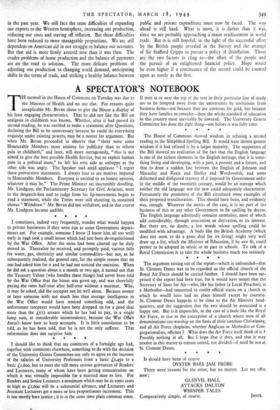I sometimes, indeed very frequently, wonder what would happen to
private businesses if they were run as some Government depart- ments are. For example, someone I know (I know him all too well) early in 1946 took a small house which had just been de-requisitioned by the War Office. After the mess had been cleared up he duly moved in. Thereafter he received, and promptly paid, various bills for water, gas, electricity and similar commodities—but not, as he subsequently realised, the general rate, for the simple reason that no one had asked him for it and he had not noticed the omission. When he did ask a question about it a month or two ago, it turned out that the Treasury Valuer (who handles these things) had never been told by the War Office that the house was given up, and was cheerfully paying -the rates half-year after half-year without a murmur. Why, it may be asked, did the occupier not let well alone. Because sooner or later someone with not much less than average intelligence in the War Office would have noticed something odd, and the unfortunate ratepayer would have been dropped on for a good deal more than the £172 arrears which he has had to pay, in a single lump sum, at considerable inconvenience, because the War Office doesn't know how to keep accounts. It is little consolation to be told, as he has been told, that he is not the only sufferer. That information does not surprise him.
* * * *






































 Previous page
Previous page